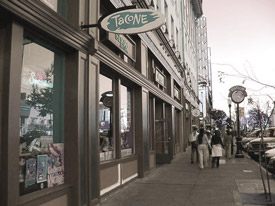On Berkeley's business climate
Berkeley has historically had an anti-business reputation, putting in place quotas on restaurants or types of stores in different neighborhoods. This has created a lot of vacancies in some areas like Solano Avenue.
Over the last few years, however, the city has tried to become more business-friendly and is trying to turn itself into more of a high-tech hub.
Many start-ups incubate at UC Berkeley, says Dinkelspiel, but then move to Palo Alto or San Jose to be closer to Silicon Valley. "There's this big brain-drain from Berkeley. The city and its business community are trying to reverse that right now."
For example, the city council has long zoned West Berkeley as an industrial area in order to retain manufacturing companies, and that has made it difficult for other businesses to take root there. The council is now reviewing those rules.
One business that the city lost because of zoning restrictions is Cliff Bar, which wanted to include a childcare site that didn't comply with city regulations at the company's headquarters. The company instead opened a new facility in Emeryville.
Some are concerned about relaxed zoning laws, however, expressing fears that artists who now reside in those areas will be driven out by higher rents.
